"The battle is cruel and bloody" at Borisov
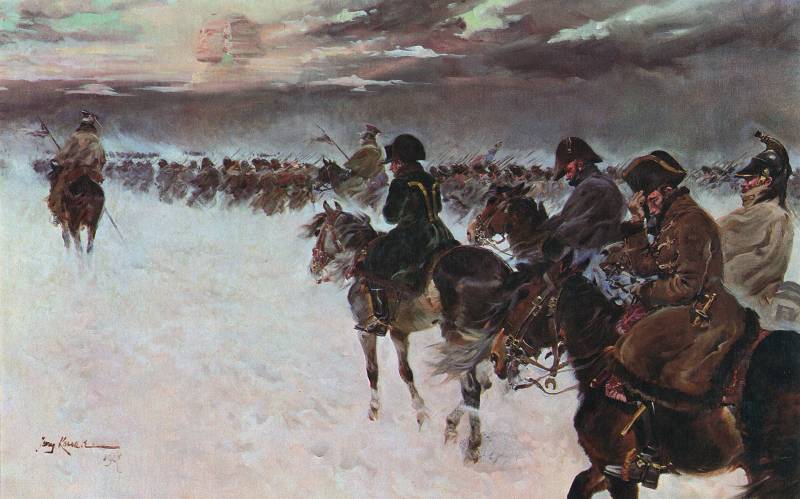
E. Kossak. Napoleon's retreat from Russia
210 years ago, Lambert's detachment defeated the Polish-French troops near Minsk and liberated Borisov in a cruel and bloody battle.
South direction
In the early autumn of 1812, the situation in the southern direction was stable. In Bobruisk, the Russian garrison of Ignatiev stood, he fettered Dombrovsky's division. Ertel's 15-strong corps was stationed near Mozyr; a division of General Moro was put up against it. After the battles near Kobrin and Gorodechno, Tormasov's 3rd Army withdrew across the Styr River, waiting for the approach of the Danube Army from Bessarabia.
Russian troops did not conduct active hostilities, as did their opponents. The Saxon and Austrian corps of Renier and Schwarzenberg did not disturb Tormasov's army and gave it the opportunity to calmly join Chichagov's army. The Rainier corps was small for active operations, and the Austrians did not want to fight the Russians. Vienna had secret connections with Petersburg and hesitated in anticipation of Napoleon's decisive victory or his failure.
On September 6 (18), the 38-strong Danube army of Admiral Chichagov reached the southern theater of operations near Lutsk. The combined forces of Chichagov and Tormasov numbered more than 60 thousand people. Schwarzenberg and Rainier together had over 40 thousand soldiers. The Russians gained superiority in forces on the southern flank. Kutuzov demanded to oust the enemy from Volhynia and create a threat to the right wing of the Great Army.
On September 10 (22), the Russians crossed the Styr, which forced the enemy to begin a retreat. Kutuzov instructed the troops of Tormasov and Chichagov to join the main army, but the commanders did not report directly to the commander-in-chief, having instructions from Emperor Alexander I. Therefore, Kutuzov's orders were not carried out. Russian troops gradually drove the enemy beyond the Bug, into the Duchy of Warsaw. The losses of Rainier and Schwarzenberg were small.
Thus, Chichagov's troops got the opportunity to attack the southern flank of the Great Army, strike at Dombrovsky's detachment or go to Minsk. On September 17 (29), Chichagov in Lyuboml received the plan of Emperor Alexander, according to which he was to lead troops to the Berezina River. On September 22 (October 4), after Tormasov's departure, Chichagov took command of two armies and moved the army to Brest. The enemy surrendered the city without a fight. Chichagov's army rested in Brest for two weeks. Two detachments were sent to the rear of the enemy - under the command of Chaplits to Lithuania and Chernyshev to Poland.
The commander divided the army into two parts. Against the Austro-Saxon troops, a 27-strong army was left with 92 guns under the command of Osten-Saken. It included the corps of Bulatov, Lieven and the Cossack regiments. Saken was supposed to defend the Podolsk and Volyn provinces. A separate detachment was left at Vladimir-Volynsky. The main forces as part of the vanguard of Lambert, the corps of Voinov, Sabaneev were supposed to go through Pruzhany to Minsk and further to the Berezina. Chaplit's detachment was to join Chichagov's army.
It was also expected that the main strike force would be reinforced by the Leaders detachment from Bessarabia and Ertel's corps. That is, the admiral's army was supposed to have up to 45-50 thousand bayonets and sabers with 180-200 guns. The appearance of Chichagov's army on the main communications of Napoleon's army created a threat of encirclement and defeat of the main enemy forces.
On October 18 (October 30), Chichagov's troops went in two columns in the direction of Pruzhany - Slonim. On October 25 (November 6), the Russians made a stop in Slonim. October 27 (November 8) troops moved to Minsk and Berezina.
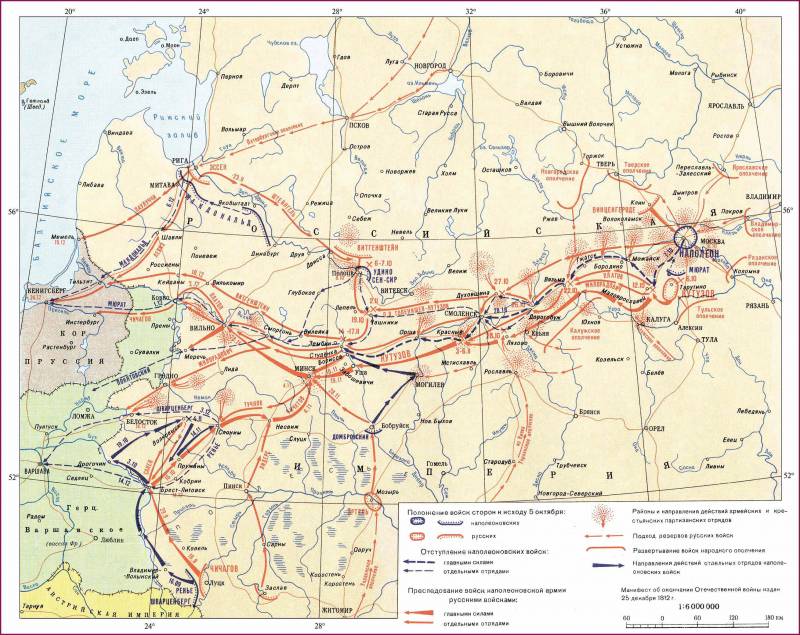
Battle near Volkovysk
Schwarzenberg, having received news of the enemy's offensive, believed at first that the entire Russian army had left the Brest area. The Austrians decided to follow the Russian army and attack it. The Austrians marched towards Volkovysk. Rainier's 20th corps was left to cover the flank in the Bielsk area.
Saken, having received the news that the enemy had crossed the Bug at Drogichin, immediately set out. A small garrison was left in Brest. On October 22 (November 3), two Cossack regiments, which were part of the vanguard of Melissino, defeated two squadrons of Austrian hussars four versts from Vysoko-Litovsk, 75 people were taken prisoner. Then, on October 27 (November 8), the Russian avant-garde overtook the Austrian rearguard behind the Narew near Rudnya and captured about a hundred people, recapturing part of the convoys. The appearance of Russian troops in the rear of the Austrian army forced Schwarzenberg to act cautiously.
The Saxons of Rainier occupied Volkovysk. The troops of the corps were located on the heights outside the city, and the headquarters in Volkovysk itself. Having discovered the enemy, Saken decided to use a good moment and capture Rainier's headquarters. Three detachments were supposed to capture the city in the late evening of November 2 (14) with a sudden blow. The blizzard helped the Russians covertly reach the city. The commander of the Saxon corps himself barely escaped by jumping out the window. Divisional General Dyurutt was wounded.
Russian soldiers captured the enemy office. One of the Saxon regiments, which rushed to the rescue of the headquarters, was driven back by the soldiers of the Vyatka infantry regiment and lost its banner. The disorder in the Saxon camp was intensified by the fire that began in the city, which, due to strong winds, became widespread.
The Russians successfully recaptured Volkovysk, but due to bad weather they were unable to continue the successfully launched attack. The shooting went on all night. On November 3 (15) the situation was stable. Saxon attempts to recapture the city were repulsed. Saken first sent a detachment of Melissino to attack enemy positions, but then withdrew the troops, because he received a message about the movement of the Austrians to Volkovysk to help the Saxons.
In the evening, the patrols reported that Schwarzenberg had again turned towards Slonim. In fact, the Austrian army was waiting for Rainier's signal to hit the enemy. Saken, convinced of the superiority of his forces, ordered on November 4 (16) to launch an offensive. Rainier, aware of the approach of the Austrians, also prepared for battle.
The battle on November 4 (16) began with an artillery skirmish. General Bulatov with 3 regiments was sent to bypass the left flank of the enemy. However, it soon became known that in the rear the Austrians captured Isabelin, where there were infirmaries and carts. Serpukhov dragoons overturned the enemy's advanced squadrons, recapturing part of the convoys. Meanwhile, the Saxons successfully withdrew to Gniezno.
Saken withdrew troops to the Svisloch. As a result, the Austrians and Saxons were unable to defeat the Russian troops. There are no exact data on losses in this battle. Russian sources report only 500 captured enemies and 100 dead Russians. Foreign sources report heavy losses of the Russian army (2-10 thousand people), clearly exaggerating our losses.
Saken solved the main problem - he did not allow Schwarzenberg to go to the rear of Chichagov's army. The Austrians and Saxons continued to act together, trying to overtake and defeat the Osten-Saken group. On November 6 (18), Saken's troops left Rudnya, repulsed the attack of the vanguard of Schwarzenberg and retreated to Belovezhskaya Pushcha, destroying the bridges behind them.
Soon, Russian troops settled south of Brest-Litovsk. The Russian commander was able to save his detachment, skillfully maneuvered, evading the battle with superior enemy forces and distracting them from the main direction.
The defeat of the French near Minsk
Receiving news of the retreat of the French army, Chichagov's troops accelerated the march. Lambert's detachment went to Nesvizh, followed by the rest of the army. Chichagov's troops went to Minsk. The city was a prominent communications hub and supply base for Napoleon's army. The garrison in Minsk was weak: about 2 thousand veterans and 3,6 thousand recruits who were being trained. General Dombrovsky advanced into the city, but his forces also could not resist Chichagov's army.
The commander of the garrison Bronikovsky sent about 3,5 thousand soldiers under the command of Kosetsky to Novo-Sverzhen to cover the crossing over the river. Neman, and if necessary, destroy it. Kosetsky did not destroy the bridge and crossed the river. On November 1 (13), Lambert's vanguard defeated the enemy with a sudden attack, captured the city and the crossing. The enemy battalion, which was standing in the city, managed to make only one volley and was forced to lay down weapon. The victory was complete: the enemy lost up to 500 people killed and about 800 prisoners. Losses of Russian troops - 7 killed, 37 wounded.
On November 2 (14), the Cossacks of the avant-garde, with the support of the Arzamas Dragoon Regiment, completely destroyed a small enemy detachment (300 people). On November 3 (15), Kosetsky's detachment was completely defeated. The enemy cavalry was overturned, 2 French battalions were surrounded. Kosetsky fled to Minsk with a hundred lancers. The French, surrounded on all sides, bravely fought back and repulsed several attacks. But when four guns were brought up and they began to shoot them with grapeshot, the French capitulated. Then two Lithuanian battalions were blocked and surrendered without a fight. Kosetsky's detachment ceased to exist: in three days the enemy lost only prisoners up to 3 thousand people, two guns were captured. The losses of the Russian troops were insignificant.
Dombrovsky managed to arrive with part of his division to Minsk, but seeing that the situation was hopeless, he withdrew troops to Borisov. On November 4 (16), Lambert occupied Minsk, capturing about 2 thousand enemy soldiers, mostly sick and wounded, large warehouses with food and fodder. On November 5 (17), the main forces of Chichagov's army arrived at the city.
At the same time, the Cossacks and dragoons on the Vilna road captured about 2 thousand more prisoners and many convoys. Chichagov's army was reinforced by two regiments from the detachment of General Leaders, who arrived from the Balkans. They were waiting for the arrival of Ertel's 15th corps. This allowed the admiral to independently attack the remnants of Napoleon's army. Ertel showed excessive caution and did not go to connect with Chichagov.
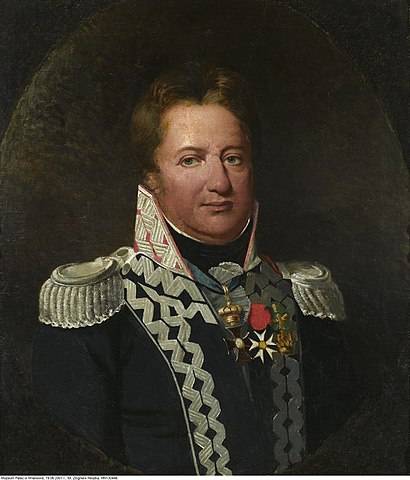
Divisional General of the Great Army Jan Henryk Dąbrowski
Fight at Borisov
On November 7 (19), 1812, Lambert's reinforced vanguard (up to 4,5 thousand soldiers in total) headed for Borisov in order to establish contact with Wittgenstein's northern army. Behind Lambert were the main forces of Chichagov. Intelligence reported that the French garrison in the Borisov bridgehead was awaiting the arrival of Dombrovsky's detachment and Viktor's corps. On November 6 (18), Bronikovsky arrived at Borisov with the remnants of the Minsk garrison. On November 8 (20) in the evening, a very tired detachment of Dombrovsky (about 5 thousand people) approached.
Lambert decided to immediately attack the French without waiting for enemy reinforcements to arrive. Lambert's troops made a big transition, covering 35 miles in a day on bad roads. After a short rest, the march was continued at night, and the soldiers covered up to 50 miles in a day. In the early morning of November 9 (21), Lambert gave the order to prepare for battle until the enemy discovered our troops.
The Russians took down Bronikovsky's forward posts without firing a shot and around 6 am were within firing range of the fortifications. Under the thunderous "Hurrah!" the chasseurs captured the flank redoubts. Panic broke out in the enemy camp. Only one regiment (1st Line) under the leadership of a veteran of the Italian campaign, Colonel Malakhovsky, did not succumb to panic and overturned the rangers of the 38th regiment, who captured the left redoubt. Lambert transferred the 7th Jaeger Regiment to this direction under the command of Major General Engelhardt, who was advancing in the center. The Russian soldiers, led by Engelhardt (he fell in this battle), hit the flank of the enemy column, overturned it and recaptured the redoubt.
The Poles from the village of Dymki moved two battalions under the command of Colonel Seravsky to recapture the right redoubt. Jaegers of the 14th regiment overturned the enemy and drove him into the forest. At about 10 o'clock in the morning, the rest of Dombrovsky's troops came out against the Russian right flank, they were supported by Seravsky's soldiers. The position of Lambert's troops was critical, he was bypassed by superior enemy forces. However, the brave and resolute commander did not think about retreat. The general advanced against the Poles the 12th cavalry artillery company with one battalion of the Vitebsk regiment and Alexandria hussars. The Poles were stopped by artillery fire, and then overturned by an attack by infantry and hussars. The defeated enemy troops retreated across the ice of the Berezina to the forces of Dombrovsky near Borisov. At the same time, another battalion of the Vitebsk regiment and the Arzamas dragoons again drove the Poles into the forest, who wanted to strike at the rear of our troops (they would cross the river above Borisov).
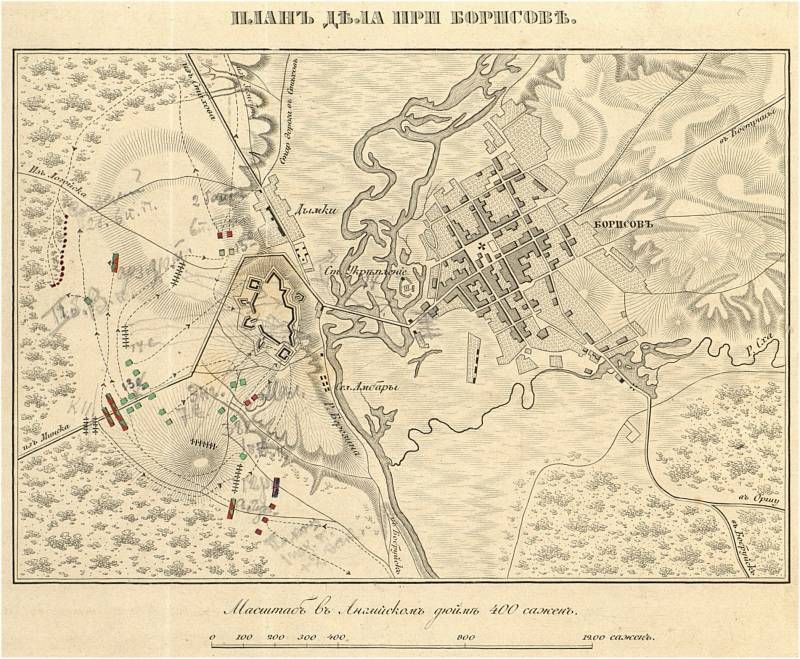
The plan of business at Borisov. Source: Bogdanovich. History World War 1812 of the year. Volume III.
Russian troops again stormed the bridgehead. Lambert supported the attackers with his presence, but was severely wounded in the leg (healing would take a year and a half). The brave general refused to leave the battlefield.
The artillery bombardment was resumed and brought the enemy into complete disorder. Attempts by Dombrovsky's troops to cross into the fortification were thwarted by Russian fire, it did not work out to support the garrison with artillery from the left bank. At three o'clock in the afternoon, the Russian rangers broke the stubborn resistance of the enemy. The enemy threw 6 guns and fled across the bridge. Jaegers on the shoulders of the enemy moved to the left side of the Berezina. They were followed by dragoons, hussars and artillery. The Polish troops, driven out of the city, fled towards Orsha, pursued by the Russian cavalry. On November 10 (22), Chichagov's main forces reached Borisov.
Reporting on the capture of Borisov, Chichagov wrote to the emperor:
Lambert's detachment won another brilliant victory in a brutal and bloody battle. The enemy lost 1,5-2 thousand people killed, 2-2,5 thousand people captured. Our losses were heavy: 1,5-2 thousand people killed and wounded (almost half of the vanguard that went to Borisov).
It should be noted that the severe wounding of Lambert will have a negative impact on the further actions of Chichagov's troops. When the wounded Lambert was taken from Borisov along the river. Berezina for treatment, he foresees the crossing of the remnants of Napoleon's army at Studyanka, about which he will send Chichagov to convey. Unfortunately, this brilliant general will not be at the decisive moment of the battle on the Berezina, which will help the French to make a breakthrough across the river.
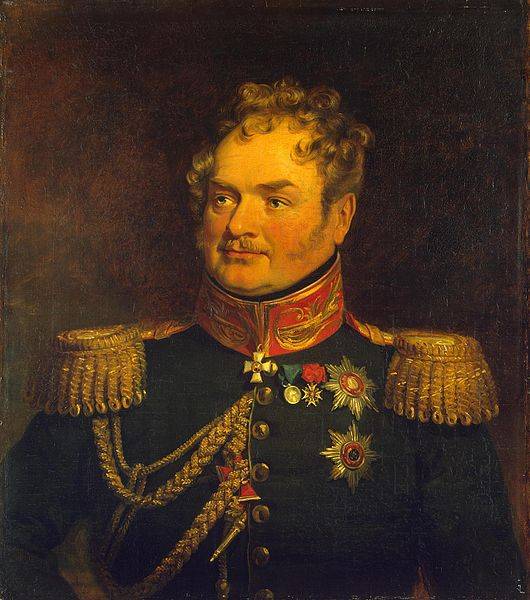
Portrait of Karl Osipovich Lambert by George Dow. Military gallery of the Winter Palace
Information